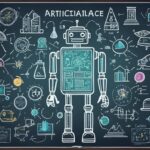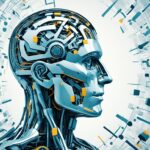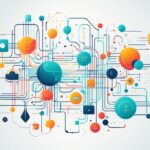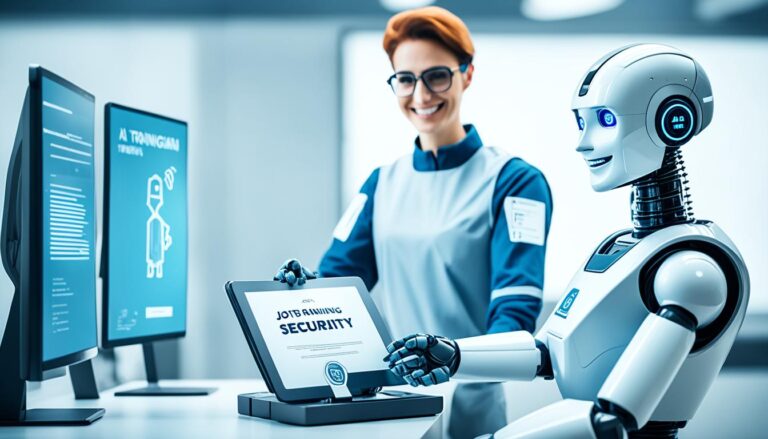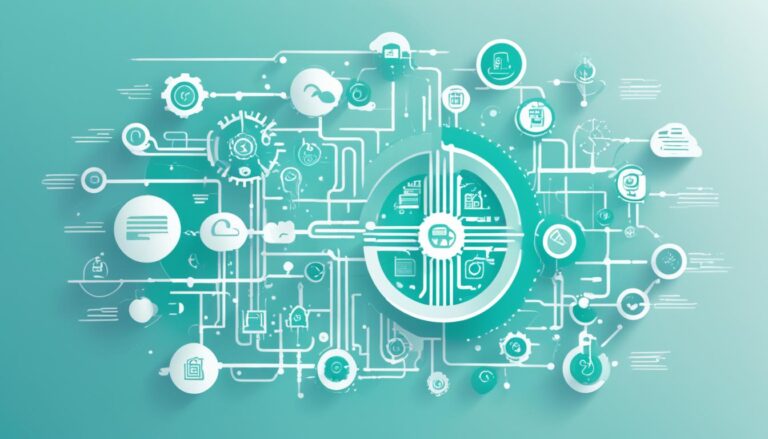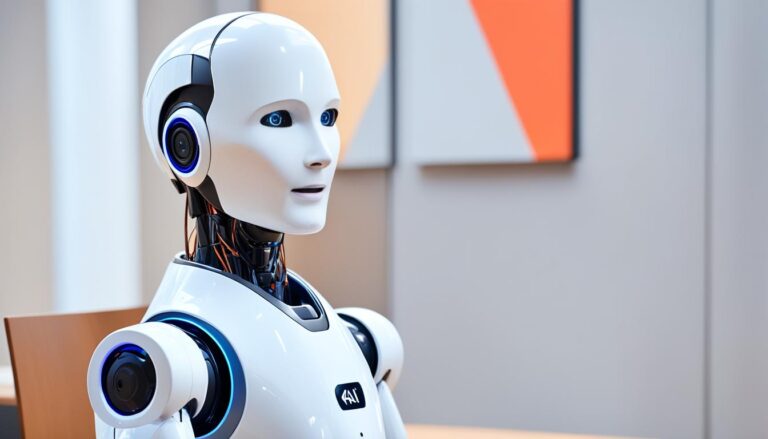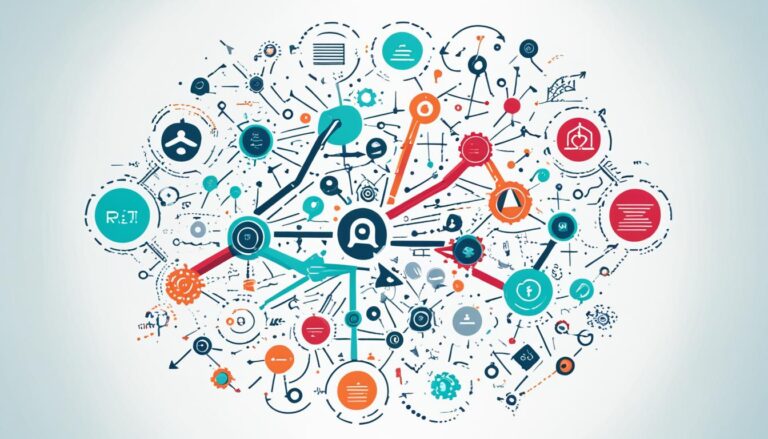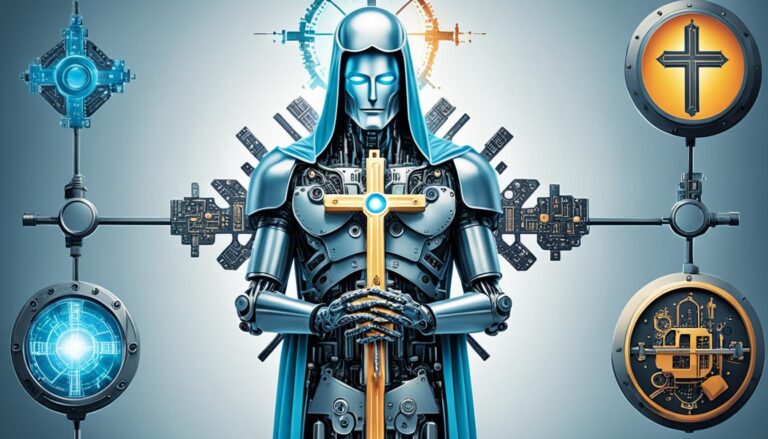The field of artificial intelligence (AI) has grown quickly. It offers a lot of information for those wanting to learn about it. It’s important for educators, students, or industry professionals to have key references. These references help understand AI and its effects. This article will discuss important resources that cover various topics. They include AI’s impact on education and the details of AI algorithms.
AI’s impact on education is a hot topic. The launch of ChatGPT in November 2022 started many discussions. It’s about how AI should fit into learning environments. Articles like “Unpacking the ‘Black Box’ of AI in Education” offer great insights. They explain AI’s effects on learning and how educators can shape AI’s future.
For a deeper dive into AI, there are some must-read books. “Artificial Intelligence: A Modern Approach” and “Deep Learning” cover key concepts and techniques. They provide a strong base for more learning.
AI raises big ethical questions for society. Reading “A Thousand Brains” and “AI Superpowers” can expand your understanding. They discuss the social and economic impacts of AI. Also, they talk about the potential risks and benefits.
Seeing how AI is used in different fields is key. “Artificial Intelligence in Practice” presents case studies across sectors. These show the practical use of AI technologies.
To keep up with AI, you need to know the latest trends. “The Alignment Problem” and “Architects of Intelligence” give a glimpse into the future. They explore possible developments and upcoming challenges.
If you’re into the technical bits of AI, there are resources for that too. “Deep Learning” and “Artificial Intelligence Engines” dive into the math and theories of AI. They are great for those keen on the technical side.
In conclusion, learning about AI requires looking at different aspects of the field. The resources mentioned help you understand AI’s effect on education, its technical details, and what the future might hold. These references are invaluable for educators, students, or professionals. They guide you on your journey to understanding and studying artificial intelligence.
Recommended Books on Artificial Intelligence and Machine Learning
If you’re keen to learn more about AI and machine learning, plenty of top books are out there. They cover the basics and more advanced topics in AI. These books offer insight into AI’s future and machine learning.
Books on AI
- Artificial Intelligence: A Modern Approach by Stuart Russell and Peter Norvig
- Deep Learning by Ian Goodfellow et al.
- Atlas of AI by Kate Crawford
- Architects of Intelligence by Martin Ford
Books on Machine Learning
- Machine Learning: a Probabilistic Perspective by Kevin P. Murphy
- Pattern Recognition and Machine Learning by Christopher M. Bishop
- The Hundred-Page Machine Learning Book by Andriy Burkov
- Hands-On Machine Learning with Scikit-Learn, Keras, and TensorFlow by Aurélien Géron
“Artificial Intelligence: A Modern Approach by Stuart Russell and Peter Norvig is a comprehensive and widely acclaimed book that covers the fundamentals of AI. It provides a solid foundation for understanding AI techniques and methodologies. For those interested in delving into the concepts and applications of deep learning, Deep Learning by Ian Goodfellow et al. is highly recommended. This book explores the theory and implementation of deep learning algorithms, making it an invaluable resource for anyone looking to master this cutting-edge technology. Atlas of AI by Kate Crawford offers a critical examination of the social and political implications of AI, providing thought-provoking insights into the ethical considerations of AI development and deployment. Finally, Architects of Intelligence by Martin Ford offers a collection of interviews with notable figures in the AI field, providing unique perspectives on the future of AI and machine learning.”
Written by leading experts, these books are considered top resources. They are perfect for students, researchers, or professionals. They provide the knowledge and insight needed for the AI and machine learning world.
| Book Title | Author(s) |
|---|---|
| Artificial Intelligence: A Modern Approach | Stuart Russell and Peter Norvig |
| Deep Learning | Ian Goodfellow et al. |
| Atlas of AI | Kate Crawford |
| Architects of Intelligence | Martin Ford |
Impact of AI on Society and Ethics
Artificial Intelligence (AI) greatly influences our society, bringing up key ethical issues. Many writings discuss AI’s societal and economic impacts. They talk about the race to lead in AI globally and its risks and rewards. “A Thousand Brains” by Jeff Hawkins looks closely at AI. It focuses on how AI changes society and stresses careful AI use.
“AI Superpowers” by Kai-Fu Lee deeply looks at AI’s effects on society and the economy. The book explores AI advancements and the race for AI superiority among leading nations. It points out the potential results of AI growth. The book underlines ethical problems and the need to manage AI wisely. This ensures its advantages are shared and dangers are lessened.”
“The Alignment Problem” by Brian Christian talks about AI’s ethical issues and dangers. Christian shows why ethical rules are essential for AI. He urges us to take action. This is vital for the good of society, he says.
AI Ethics: A Moral Imperative
As AI grows and affects more of our life, thinking about ethics is vital. The quick progress of AI poses ethical challenges, such as privacy and fairness. Stakeholders must come together to set guidelines for AI’s responsible use.
- AI should protect privacy and personal data.
- Transparency in AI algorithms helps avoid bias.
- AI decisions must be fair to stop inequalities.
- Developers and organizations need to be accountable for AI’s effects.
Addressing these ethical issues lets us tap into AI’s benefits while limiting harm.
| AI Impact on Society | Key Findings |
|---|---|
| Economic Transformation | – Job displacement in certain sectors – New opportunities for job creation – Changes in workforce dynamics and skills requirements |
| Social Implications | – Potential improvement in healthcare and diagnosis – Ethical questions regarding AI in warfare systems – Social challenges arising from the integration of AI in everyday life |
| Technological Advancements | – Breakthroughs in natural language processing and computer vision – Enhanced automation and optimization in various industries – Acceleration of scientific research and discovery |
This table shows AI’s varied effects on society. It highlights economic changes, social issues, and tech progress due to AI. By understanding these effects, we can have informed talks on AI’s careful development and use.
Applications of AI in Various Fields
Artificial Intelligence (AI) is spreading fast in many fields, changing how businesses work. The use of AI is very important for those wanting to make their work easier and more efficient. Here are two great sources for learning about AI in action:
-
“Artificial Intelligence in Practice” by Bernard Marr and Matt Ward
This book is full of case studies showing AI in action in many areas. It looks at how AI is changing healthcare, finance, retail, and more. Marr and Ward share stories of how companies use AI to get better and serve customers well. Their book is great for anyone wanting to use AI in their field.
-
“AI and Machine Learning for Coders” by Laurence Moroney
This book is for developers and coders wanting to add AI to their projects. Moroney shows how to build AI apps, use existing models, and make new ones. He covers important topics like understanding speech and seeing images. This book is perfect for coders ready to explore the power of AI.
“Artificial Intelligence in Practice” and “AI and Machine Learning for Coders” are full of useful info on AI. They help professionals use AI to create new things in their work.
These resources help people understand how AI is changing various sectors. They offer useful tips, examples, and advice for using AI in work. By checking out these books, you can learn a lot about AI’s benefits in different areas.
| Industry | AI Applications |
|---|---|
| Healthcare | AI-powered diagnostic systems, predictive analytics for personalized medicine, automated administrative tasks |
| Finance | Automated trading systems, fraud detection algorithms, AI-powered chatbots for customer service |
| Retail | Personalized product recommendations, inventory management optimization, AI-powered virtual shopping assistants |
| Manufacturing | Quality control and defect detection, predictive maintenance, autonomous robots for assembly and logistics |
| Transportation | Autonomous vehicles, route optimization, traffic management systems |
The table above gives examples of AI in different industries. AI’s possibilities are endless. By looking into the mentioned resources and keeping up with AI updates, professionals can discover new opportunities and lead in their areas.
Emerging Trends and Future Directions in AI
AI is always changing, with new ideas shaping its future. “The Alignment Problem” by Brian Christian and “Architects of Intelligence” by Martin Ford are key resources. They give deep insights into AI’s future.
Brian Christian’s “The Alignment Problem” discusses where AI might go and its challenges. This book looks ahead at AI, looking at the ethical and technical issues. It’s very useful for those wanting to understand AI’s future better.
Martin Ford’s “Architects of Intelligence” talks to top AI researchers and leaders. Their interviews show where AI is now and its future effects. This let’s people keep up with AI trends and understand where AI is headed.
Key Takeaways:
- “The Alignment Problem” by Brian Christian dives into AI’s challenges and future.
- “Architects of Intelligence” by Martin Ford includes interviews with AI’s top minds, offering deep insights into AI’s next steps.
These books help AI workers and fans keep up with new trends. They also help shape strategies for AI’s future.
Technical Aspects of AI
If you’re keen on the technical bits of AI, many resources dive into its algorithms and theories. “Deep Learning” by Ian Goodfellow and others is a top recommendation. It covers deep learning thoroughly, explaining the maths and theories behind it.
Another great read is “Artificial Intelligence Engines” by James V. Stone. It explores AI algorithms in detail, with clear explanations and examples.
These resources help understand AI’s technical base and its algorithms. They are perfect for anyone wanting to know more about AI, from aspiring engineers to curious minds. You’ll get crucial knowledge to understand AI better.
Theories and Algorithms in AI
“The most exciting breakthroughs of the 21st century will not occur because of technology, but because of an expanding concept of what it means to be human.” – John Naisbitt
To get AI, we must know its theories and algorithms. These include areas like machine learning, natural language processing, and more.
Machine learning is AI’s core, allowing systems to learn and decide from data without explicit coding. Important methods include linear regression and deep neural networks.
Natural language processing lets machines understand human language. It uses methods like sentiment analysis so AI can talk or text with us.
Computer vision gives machines the power to see and understand visuals. Through algorithms for image classification and detection, AI systems can analyze photos or videos.
Robotics merges AI with engineering to craft smart machines. They can sense their environment, decide, and act. Techniques like motion planning are key here.
| Theories | Algorithms |
|---|---|
| Machine Learning | Linear Regression |
| Random Forests | |
| Support Vector Machines | |
| Deep Neural Networks | |
| Natural Language Processing | Parsing |
| Sentiment Analysis | |
| Language Generation | |
| Computer Vision | Image Classification |
| Object Detection | |
| Image Segmentation | |
| Robotics | Reinforcement Learning |
| Localization Algorithms | |
| Motion Planning |
These theories and algorithms are AI’s foundation, allowing the creation of smart systems in different areas. Knowing them is vital for anyone interested in AI and its growth.
Conclusion
Understanding artificial intelligence (AI) is a complex task. It involves learning about its impact on education and its technical sides. There are lots of resources to help both students and professionals in the AI field. By checking out recommended readings, you can learn a lot and keep up with AI advancements.
If you’re a teacher, a student, or working in the industry, these resources are very useful. They cover everything from how AI is changing education to its use in different industries. Plus, they discuss the ethical sides of AI and what’s new in the technology. Keeping up with recent studies and books can help you stay ahead in the AI world.
AI is changing our society and how industries work. It’s important to understand it well and use it responsibly. You can combine what you know with how it’s used in the real world. The suggested readings in this article give a broad overview of AI’s important points. This info will help you understand the complex world of AI better.
FAQ
What topics are covered in the recommended articles and books?
The recommended articles and books discuss many topics. They look at how AI affects education, its uses in different areas, and ethical issues. They also explore the future of AI and how it works.
Can the recommended resources help professionals gain insights into AI applications in their respective industries?
Yes. “Artificial Intelligence in Practice” by Bernard Marr and Matt Ward has case studies. It shows how AI is used in various sectors. This helps professionals understand AI’s impact in their industries.
Are there resources available for those interested in understanding the technical side of AI?
Indeed, “Deep Learning” by Ian Goodfellow and others talks about deep learning and its theories. “Artificial Intelligence Engines” by James V. Stone discusses AI’s algorithms. These books are great for the technical side of AI.
Do the recommended resources explore the societal and ethical implications of AI?
Yes. Books like “A Thousand Brains” by Jeff Hawkins and “AI Superpowers” by Kai-Fu Lee examine AI’s impact on society and the economy. “The Alignment Problem” by Brian Christian looks at the ethical issues in AI.
Can the recommended articles and books help professionals and enthusiasts stay updated with the latest AI trends?
Definitely. “The Alignment Problem” by Brian Christian and “Architects of Intelligence” by Martin Ford provide insights on AI’s future. They help readers keep up with new trends in AI.
What are some of the recommended books for understanding AI and machine learning?
The suggested books include “Artificial Intelligence: A Modern Approach” by Stuart Russell and Peter Norvig, and “Deep Learning” by Ian Goodfellow and others. “Atlas of AI” by Kate Crawford, and “Architects of Intelligence” by Martin Ford are also recommended. These books offer a deep understanding of AI and machine learning.
How can the recommended articles and books help educators and scholars?
The articles provide valuable insights and historical background on AI in education. The books cover AI’s concepts, techniques, and uses thoroughly. They help educators and scholars guide the future of AI in learning.




